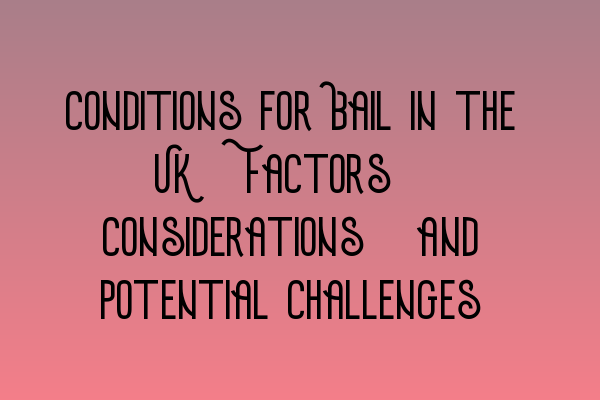Conditions for Bail in the UK: Factors, Considerations, and Potential Challenges
When it comes to criminal cases in the UK, one of the key stages is the determination of bail conditions. Bail allows an individual to be released from custody while awaiting trial, but it comes with certain conditions that must be observed. In this article, we will explore the factors, considerations, and potential challenges involved in determining bail conditions in the UK.
Factors Considered in Bail Determination
Before granting bail, courts in the UK consider several factors to assess the likelihood of an individual complying with the conditions and not posing a risk to the public or interfering with the course of justice. These factors include:
- Flight risk: The court will assess the likelihood of the individual fleeing the jurisdiction to avoid prosecution.
- Previous criminal record: The individual’s previous convictions and any history of failing to comply with bail conditions will be taken into account.
- Seriousness of the offense: The nature and severity of the alleged offense will be considered, as more serious crimes may warrant stricter bail conditions.
- Ties to the community: The court will assess the individual’s connections to the local community, such as employment, family, and accommodation, to determine their level of stability and potential for complying with bail conditions.
- Witness interference: If there is a risk of the individual interfering with witnesses or evidence, stricter bail conditions may be imposed.
These factors help inform the court’s decision on whether to grant bail and what conditions should be imposed to ensure the individual’s compliance and public safety.
Potential Bail Conditions
Once bail is granted, the court may impose specific conditions that the individual must adhere to. These conditions vary depending on the circumstances of the case but often include:
- Surrender of travel documents: The individual may be required to surrender their passport or other travel documents to prevent them from leaving the country.
- Residence requirements: The court may require the individual to provide a fixed address where they must reside and report regularly.
- Curfew: A curfew may be imposed, restricting the individual’s movement during specific hours of the day.
- Restrictions on association: The court may prohibit the individual from contacting certain individuals who are involved in the case or have potential influence.
- Reporting to a police station: Regular reporting to a local police station may be required to ensure compliance with bail conditions.
These conditions are designed to strike a balance between the individual’s right to liberty and the interests of justice and public safety.
Potential Challenges in Bail Conditions
While bail conditions are set with the aim of ensuring compliance and public safety, there can be potential challenges that arise. These challenges may include:
- Restrictions on livelihood: Bail conditions such as curfews or travel restrictions may impact an individual’s ability to work or fulfill other obligations.
- Financial burden: Complying with bail conditions can sometimes impose a financial burden on individuals, especially if they need to relocate or report to a police station regularly.
- Presumption of guilt: Strict bail conditions can create a perception of guilt in the eyes of the public, potentially affecting an individual’s personal and professional reputation.
It is important for individuals facing bail conditions to seek legal advice to understand their rights and explore any potential challenges or alternative solutions.
If you are interested in expanding your expertise in criminal practice, consider participating in our Workshops and Seminars on Criminal Practice. Staying informed and prepared is crucial in the ever-evolving landscape of UK criminal laws, so be sure to check out our article on Updates in UK Criminal Laws. Enhance your SQE Criminal Law study group experience by reading our article on Enhancing Your SQE Criminal Law Study Group Experience. For a detailed analysis of criminal evidence rules, we invite you to read our article on Decoding Criminal Evidence Rules. Finally, if you are interested in diving deeper into the world of fraud and financial crimes, check out our article on Fraud and Financial Crimes in the UK.
Remember, understanding the conditions for bail in the UK is essential for both legal professionals and individuals involved in criminal cases. By considering the factors, understanding the potential challenges, and staying informed, we can navigate the bail process effectively and responsibly.
